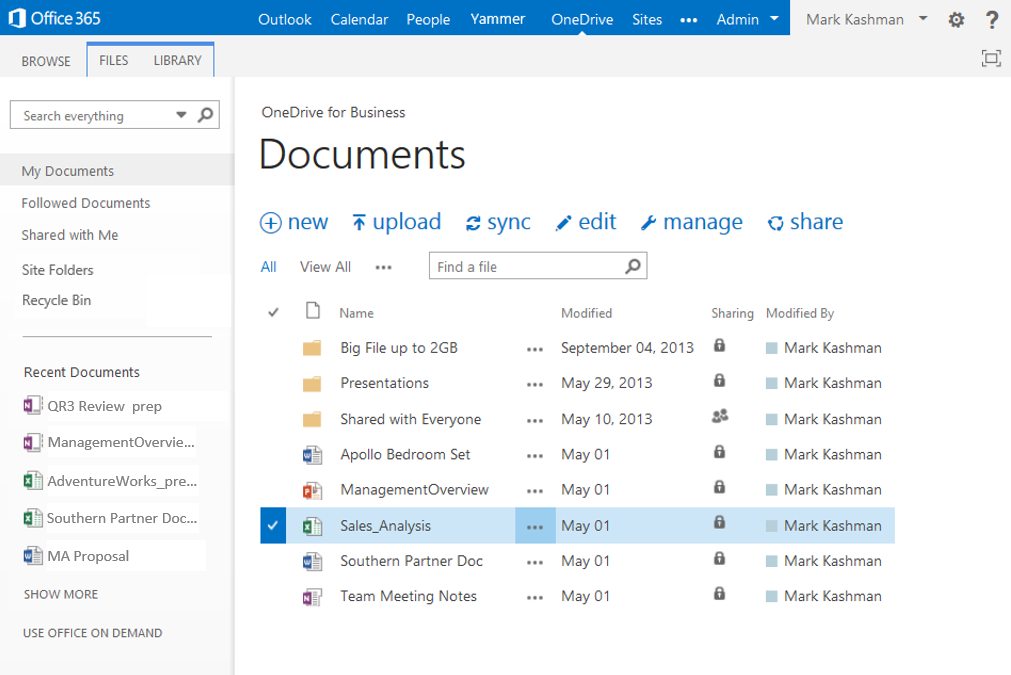What is cloud storage
Wikipedia describes cloud storage as “a model of computer data storage in which the digital data is stored in logical pools, said to be on ‘the cloud'”. In simple terms, when users use cloud storage, they store their data on the Internet. Essentially, the digital data is stored on servers, which are managed by a hosting company. Cloud storage service providers like the ones at venyu.com/colocation/ give users access to the storage where they can keep their files. Individual users and businesses can buy the storage capacity they need and use it to store their files. You should also be aware that there is a cloud services ISO which helps you get the right levels of control and security, so you need to make sure that you have that if you are offering cloud services as a business. 
Cloud storage has completely changed how we store and share data. We no longer need to carry around portable hard drives and USB sticks in order to access our files on devices other than our computers. We don’t need to worry about losing our data as it’s all safely stored in the cloud. We no longer need to carry around storage devices in order to share files with other people. All of that has been made easier with cloud storage. And as pointed out by Bytes Managed IT Cheyenne, moving to cloud solutions offer far more benefits than downsides
Cloud storage can be used for a variety of purposes, it’s not only great for backing up files in case they ever get lost or encrypted by malware, it’s also very convenient for sharing files with coworkers, friends and family members. In 2021, when millions of people all around the world are working from home because of the COVID-19 pandemic, cloud storage has never been more important as it allows people to share their files with no effort at all. The demand for fully-trained Salesforce experts is continuously increasing, and companies – now more than ever – are looking for proven Salesforce professionals with salesforce developer 2 certification.
Some users may not even know that they are using a cloud storage service. For example, if you own an iPhone and have an Apple ID, your files are automatically uploaded onto Apple’s iCloud.
Generally, cloud storage services are not free and prices range depending on how much storage one needs. However, many reliable services also offer free cloud storage. For example, iCloud and OneDrive offer 5GB of free storage, while Google Drive gives 15GB for free. Free cloud storage may be sufficient for someone who does not need a lot of space.
For what purposes are cloud storage services used:
- Sharing files with coworkers, family and friends.
The file-sharing feature is part of all cloud storage services. It’s a very convenient feature that allows users to send files to one another, gives multiple users access to the same cloud environment where users can download, add, edit, and delete files. This makes sharing even large files easy, as handing over physical storage devices is no longer necessary to share files with other people.
- Backing up files.
Backing up files has always been essential, now more so than ever. With the looming threat of ransomware and other malware, not backing up files could be a devastating mistake. Instead of using portable hard drives and USB sticks, users are choosing a more convenient option and are migrating to cloud storage for backup. There are plenty of options for users to choose from, whether they simply want to back up files, or if they require more features.
- Freeing up space of the computer.
With affordable cloud storage becoming more widely available, many users are choosing to keep their files in the cloud instead of their computers. This not only frees up space on the device but also allows users to access the data from other devices.
If you are yet to use cloud storage but have made the decision to make the transition, you may need help navigating through all the cloud storage services available. To help you choose the best service, we have prepared a list of the 5 best cloud storage services of 2021.
Best cloud storage services of 2021
IDrive
- Storage size: 5 – 10TB for personal user, different size plans for businesses.
- Free cloud storage: 5GB.
- Number of devices: Unlimited for one user.
IDrive is constantly topping the lists for best cloud storage service, and not without reason. Its plentiful features, reliable services, and adequate prices make it one of the best choices when it comes to cloud storage.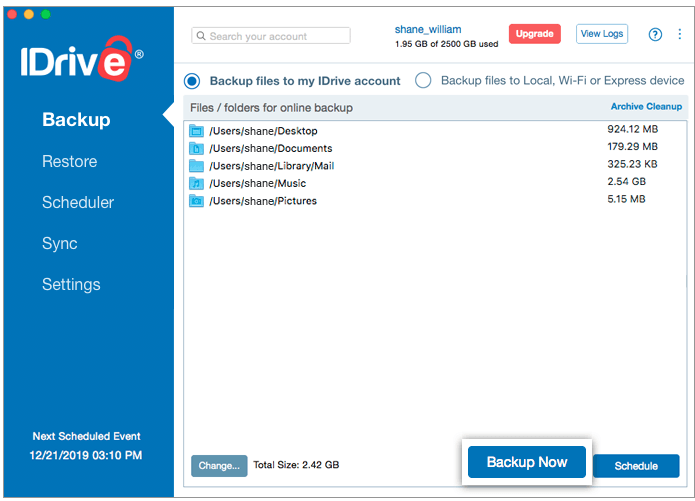
Accessible from PCs, Macs, iPhones, iPads and Android devices, IDrive covers all major operating systems. It does not limit how many devices can access the storage, though it covers only one user. Files and folders will be synced in real time across all devices that are set up with IDrive. Among the features IDrive offers are various backup and data restoring options, including data via physical storage shipment. Performance-wise, IDrive is pretty great. It has good upload and restoring speeds, and does not put a strain on the operating system when actively doing something.
For users who do not require a lot of storage space, IDrive offers 5GB of free storage. Users don’t need to add a payment card, all they need to do is set it up and they can use the free storage for however long they want. For those who need more storage, IDrive offers either 5TB or 10TG. 5TB of storage currently costs $52.12 for the first year (the price changes to $69.50/year after that), or $104.25 for two years. 10TB is $74.63 for the first year (the price changes to $99.50/year after that), or $149.25 for two years. These plans allow one user to access the backup from an unlimited number of devices.
For businesses IDrive offers:
- 250GB ($74.62 for the first year, then $99.50/year; $149.25 for the first two years, then $199);
- 500GB ($149.62 for the first year, then $199.50/year; $299.25 for the first two years, then $399);
- 1.25TB ($374.62 for the first year, then $499.50/year; $749.62 for the first two years, then $999);
- 2.5TB ($599.62 for the first year, then $799.50/year; $1199.25 for the first two years, then $1599);
- 5TB ($1124.62 for the first year, then $1499.50/year; $2249.25 for the first two years, then $2999);
- 12.5TB ($2249.62 for the first year, then $2999.50/year; $4499.25 for the first two years, then $5999).
- There are also monthly plans for businesses: 1.25 TB ($49.95/month), 2.5TB ($79.95/month), 5TB ($149.95/month), and 12.5TB ($299.95/month).
We should also mention that it’s possible to find great deals for IDrive. There currently is an amazing deal available, 5TB of cloud backup for a staggering $3.48 for the first year.
Pros:
- free 5GB of storage;
- unlimited devices;
- good upload/download speeds;
- easy-to-use/user-friendly interface.
Cons:
- no monthly payment option for personal plans.
Microsoft OneDrive
- Storage size: 5Gb – 6TB.
- Free cloud storage: 5GB.
- Number of devices: 30.
Microsoft OneDrive is a favorite among users, primarily for its convenience. It’s most commonly used by Windows and Office 365 users, but it’s also accessible from devices running macOS, iOS and Android. Microsoft OneDrive has a very easy-to-use user interface, particularly for those using Microsoft 365 and Windows. Users can easily upload files onto OneDrive to access them from a different device, and can share them with users who do no have OneDrive. One great feature allows users to edit files directly on OneDrive without needing to download those files first. There is also Personal Vault, a feature that allows users lock files with two-factor-authentication. A document scanning feature allows users to use their mobile device to scan and immediately store various documents.
Perhaps OneDrive’s most important feature is backup. Setting up a backup is incredibly easy and convenient. Uses can set up files to be automatically backed up and synced, and all backed up files can be accessed from all devices associated with that OneDrive account. OneDrive also detects ransomware attacks and can help users recover files up to 30 days after an attack. Users can also easily restore previous versions of files, up to 30 days in the past.
OneDrive offers different plans, depending on what users need. For users who only need a small amount of storage, there is OneDrive Basic plan that allows 5GB of storage for free. Users can use it for however long they need, as long as they don’t surpass 5GB, they don’t need to pay. For $1.99/ per month, users can get 100GB of storage. The other two plans come with Microsoft 365 included. The Microsoft 365 Family plan costs $99.99/year, allows up to 6 users, includes 6TB of OneDrive storage (1TB per person), Skype and all Microsoft 365 apps (Outlook, Word, Excel and PowerPoint). The Microsoft 365 Personal plan is $69.99/year, and is meant for one user, includes 1TB of OneDrive storage, Skype, and all Microsoft 365 apps. Users can pay on a monthly basis instead of for the whole year.
The plans do not come with the same features. For example, both the Microsoft 365 Family and Personal plans have full advanced security, which includes Personal Vault, shared link expiration, ransomware detection and recovery, file restoration, and password-protected link sharing. The free and the 100GB plans only have Personal Vault, and only partially. While Family and Personal accounts can store an unlimited number of files in Personal Vault, free and 100GB accounts can only store 3.
Pros:
- free for Office 365 users;
- allows edits directly in OneDrive without needing to download the file;
- free 5GB of storage;
- automatic backups and ransomware protection;
- easy-to-use with a user friendly interface;
- allows monthly payments.
Cons:
- OneDrive Standalone 100GB has limited features despite being a paid option.
pCloud
- Storage size: 500GB – 2TB.
- Free cloud storage: 10GB.
- Number of devices: 5.
pCloud stands out from all other cloud storage services by offering affordable lifetime plans, though there aren’t many storage size options, it’s either 500GB or 2TB. Nonetheless, lifetime access is likely to be a deciding factor for users choosing cloud storage services. pCloud has a desktop and a mobile app, as well as web access. It’s also available for all major platforms, including Windows, macOS, Linux, iOS and Android.
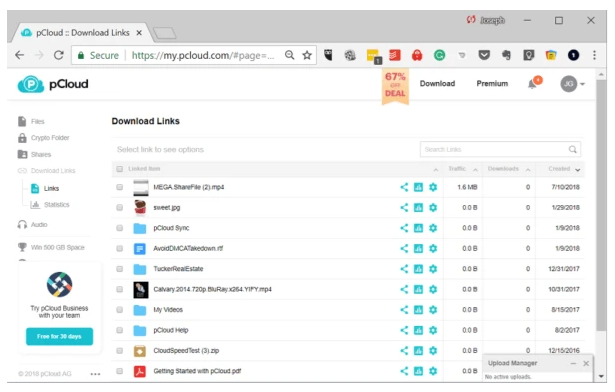
pCloud can boast of an easy-to-use, user-friendly interface that’s not too complicated despite having many features. pCloud allows for direct streaming of video and audio files without needing to download them from the storage first. It should be noted that this isn’t a feature that all cloud storage services have. The file versioning feature allows users to recover past versions of the files, up to 30 days in the past. This feature can also be used for the entire account instead of just individual files. Users can also easily share files and folders with each other, and there is even a customization feature that allows to brand links by setting an image, heading and description.
An interesting feature offered by pCloud is social media integration. All uploads to platforms like Facebook and Instagram would be backed up to pCloud.
New users get 10GB of free storage. pCloud is a great choice for those looking to purchase permanent storage. It has annual and lifetime plans, both offering either 500GB or 2TB of storage. The annual Premium 500GB subscription plan is $59.88/year, though there currently is a 20% discount, making the price $47.88/year. If 500GB of storage is not enough, the Premium Plus plan offers 2TB of storage for $119.88 (the price currently is $95.88 with a 20% discount). But instead of paying annually, users have the option of purchasing a lifetime subscription. For 500GB of storage for life, users would need to pay $480 (though the current price is $175 with a 65% discount), and for 2TB – $980 (or $350 with the current 65% discount). Both Premium and Premium Plus plans, whether annual or lifetime, come with features like Fair share, Share link branding, 30 days trash history, and either 500GB or 2TB of shared link traffic, depending on what storage amount is purchased.
Pros:
- affordable lifetime plans;
- easy-to-use interface;
- automatic backup of social media posts.
Cons:
- only 500GB and 2TB storage, no in-between options.
Google Drive
- Storage size: 100GB – 2TB.
- Free cloud storage: 15GB automatically available for all Google accounts.
- Number of devices: Unlimited.
Google Drive is part of a much larger platform, which is known as Google Workspace (formerly called G Suite). The Google Workspace consists of Gmail, Contacts, Calendar, Meet and Chat, Currents, Google Drive and Google Docs suite. For users who already use the majority of these platforms, using Google Drive for storage would be most convenient. Just like if users are using Office 365 Microsoft OneDrive would be more convenient, users in the Google ecosystem will find Google Drive more suitable.
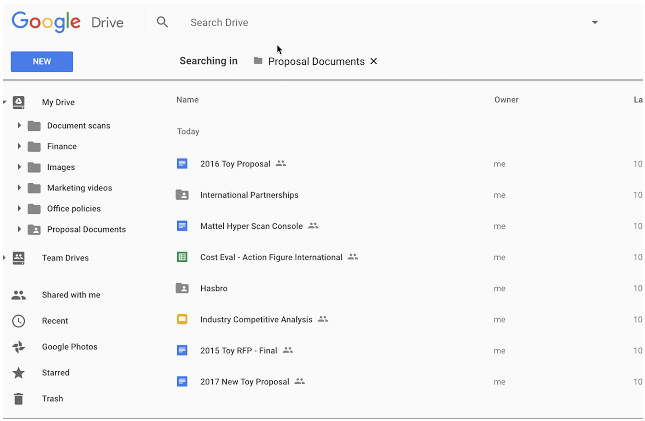
Google Drive has both a web application and a local one. The Google Drive local application allows users to backup and sync files automatically. Both the online and the desktop versions are quite user friendly and are easy to navigate. Sharing files is very easy, though Google Drive does not allow to set a password for them.
One concern that Google Drive users may have is privacy. Since Google essentially lives off of users’ data, it has had many privacy scandals in the past. User online data is highly valuable for advertising purposes, and Google does collect it. It’s possible to turn off this tracking to some extent but if users are concerned with their privacy, Google Drive or any Google services may not be the best choice.
Google Drive has a free 15GB plan for users to use for an unlimited amount of time. This is quite a lot of free storage, triple the amount offered by OneDrive. For individual users who need more space, there are three plans. 100GB of storage is $19.99/year or $1.99/month if paid on a monthly basis, 200GB – $29.99/year or $2.99/month, and 2TB is $99.99/year or $9.99/month. In addition to the storage, the plans also include access to Google experts, option to add family members, and extra member benefits.
Pros:
- very convenient when using Google Workspace apps;
- 15GB of free storage, triple the amount offered by OneDrive;
- allows online editing;
- user-friendly interface for both online and desktop apps.
Cons:
- not possible to set a password for shared files;
- possible privacy concerns.
Apple iCloud
- Storage size: 50GB – 2TB.
- Free cloud storage: 5GB for Apple device users.
- Number of devices: 5.
For those deep in the Apple ecosystem, Apple’s iCloud may be the most optimal choice, as it works great with Apple devices (iPhones, iPads, MacBooks, and iMacs) and does not require any additional downloads or setups. Users automatically get 5Gb of storage when they purchase their first Apple device and set up their Apple ID account. Because it’s primarily meant to work within the Apple ecosystem, it’s very easy to setup new devices when users have an existing Apple account. If the previous device was backed up in the iCloud, simply logging in with the Apple ID into the new device sets it up.
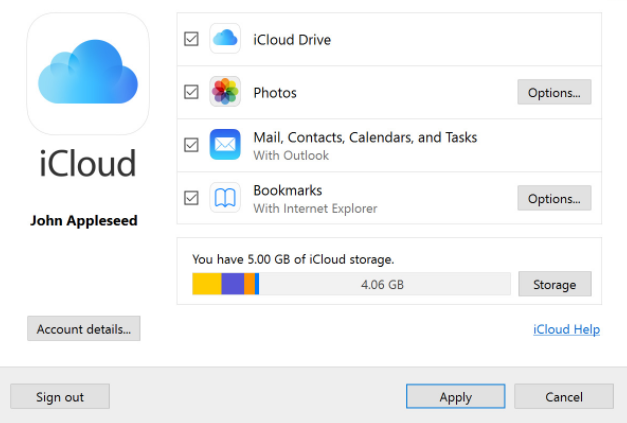
It’s very easy to use for backing up files on Apple devices. Files backed up in the iCloud are accessible from all devices that are logged in into the Apple account. The files can also be accessed via the iCloud website. iCloud is also automatically available on all Macs. Users are prompted to set it up when setting up their Macs for the first time. For Apple device users who only need to back up files, iCloud should be more than enough. iCloud allows file/folder sharing, and it’s easy to set up as well, though an iCloud account is necessary to view the files.
Apple’s iCloud has a very sleek design, though the web version is rather basic. It’s easy-to-use interface is also a big plus. It should be mentioned that while iCloud works adequately with Windows computers, the same cannot be said for Android devices. Since there is no Android app, users will not be able to sync up their devices. Though Android users will be able to access their iCloud via the web version.
When users create an iCloud account, they automatically get 5GB of free storage. If more is necessary, users can add 50GB, 200GB, and 2TB of storage. The prices for these storage plans differ slightly in each country. For US users, 50GB of storage is $0.99/month, 200GB is $2.99/month and 2TB is $9.99/month. Family accounts can share the 200GB and 2TB storage.
Pros:
- works great within Apple’s ecosystem;
- free 5GB of storage;
- easy to use and set up;
- smooth interface.
Cons:
- no Android app.
